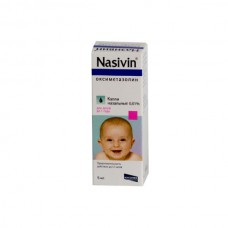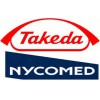Expiration date: 01/2026
The composition and form of issue:
Drops 0,01%. 1 ml contains Oxymetazoline hydrochloride 0.1 mg
in dark glass bottles with lid-pipette of 5 ml in a cardboard pack 1 bottle.
Drops of 0.025%. 1 ml contains Oxymetazoline hydrochloride 0.25 mg
in dark glass bottles with lid-pipette of 10 ml in a cardboard pack 1 bottle.
Nasal drops 0,05%. 1 ml contains Oxymetazoline hydrochloride 0.5 mg
in dark glass bottles with lid-pipette of 10 ml in a cardboard pack 1 bottle.
0.05% nasal spray. 1 ml contains Oxymetazoline hydrochloride 0.5 mg
in polyethylene bottles with a sprayer for 10 ml in a cardboard pack 1 bottle.
Description pharmaceutical form:
An aqueous solution of Oxymetazoline hydrochloride in a concentration of 0.01, 0.025 and 0.05%.
Description pharmacological action:
Being a derivative of imidazoline, at low concentrations it has a mostly &alpha2-adrenomimetic action, at high — act and alpha1-adrenergic receptors.
Constricts blood vessels at the site of application, reduces swelling of the nasal mucosa and upper respiratory tract. Local nazalnam when used in therapeutic concentrations does not irritate, does not cause hyperemia.
Studies labeled with a radioactive isotope Oxymetazoline showed that it sinologicheskoj tool, inserted through the nose, not has a systemic effect.
Indications:
- Acute rhinitis (including allergic), vasomotor rhinitis, perinatalnyj sinusitis, evstahiit, otitis media.
- Vasoconstriction of mucous membrane for diagnostic purposes (under medical supervision).
Contraindications:
Hypersensitivity to the drug, atrophic rhinitis, angle-closure glaucoma.
Age up to 1 year — for Nasivin 0.025 and 0.05% before age 6 years for Nasivin of 0.05%.
Application of pregnancy and breast-feeding:
During pregnancy and breastfeeding is not allowed to exceed the recommended dosage. The drug should be used only after careful assessment of benefit and risk to mother and fetus.
Side effects:
Sometimes, burning or dryness of the nasal mucosa, sneezing rarely is a strong feeling of "stuffiness" of the nose (reactive hyperemia) very rarely — anxiety, insomnia, fatigue, headache, nausea.
Multiple overdose with local nazalnam use sometimes leads to such systemic sympathomimetic effects such as increased heart rate (tachycardia) and increased blood pressure.
Drug interactions:
A significant overdose or ingestion Nazivin and receiving tricyclic antidepressants or MAO inhibitors at the same time or directly before the application Nazivin can lead to increased blood pressure.
Currently, known cases of drug incompatibility not.
Method of application and dose:
The intranasal route. Nasal drops: adults and children over 6 years — 1-2 drops in each nostril 2-3 times daily 0.05% solution children: infants up to 4 weeks and 1 drop of 0.01% solution 2-3 times a day from 5th week of life and up to 1 year — 1-2 drops 2-3 times a day, from 1 year to 6 years — 1-2 drops 2-3 times daily 0.025% solution.
To ensure accurate dosage vial Nasivin 0,01% nasal drops has graduated pipette with marks the number of drops.
Proven effectiveness the following treatments: depending on the age of 1-2 drops of 0.01% solution applied to cotton wool and wipe the nasal passages.
Nasal spray of 0.5%: adults and children over 6 years — 1 injection into each nasal passage 2-3 times a day.
The product is 3-5 days.
Overdose:
Symptoms (after a significant overdose or accidental ingestion): pupillary constriction, nausea, vomiting, cyanosis, fever, tachycardia, arrhythmias, circulatory insufficiency, arterial hypertension, respiratory disorders, pulmonary edema, cardiac arrest in addition, can appear mental disorders, as well as inhibition of the functions of the CNS, accompanied by drowsiness, low body temperature, bradycardia, arterial hypotension, cessation of breathing and possible development of coma.
Treatment: gastric lavage, administration of activated charcoal and an urgent appeal to the doctor.
Precautions:
After prolonged use or receiving drug containing Oxymetazoline, at dosages, exceeding recommended, you cannot exclude a General effect on the cardiovascular system and Central nervous system. In these cases, the ability to operate a vehicle or equipment may be reduced.
Special instructions:
Prolonged use of decongestant remedies for instillation into the nose may lead to the weakening of their actions. Abuse of these drugs can cause mucosal atrophy and reactive hyperemia with a medicamental rhinitis, as well as the damage to mucous epithelium and inhibition of the activity of the epithelium. Avoid prolonged use and overdose.





